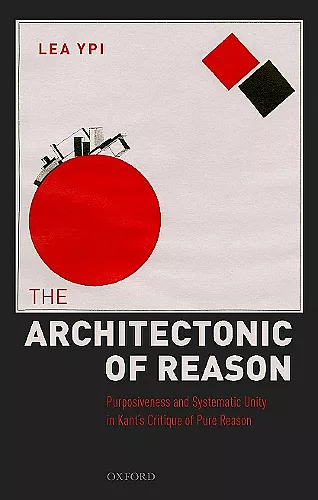The Architectonic of Reason
Purposiveness and Systematic Unity in Kant's Critique of Pure Reason
Format:Hardback
Publisher:Oxford University Press
Published:26th Oct '21
Currently unavailable, and unfortunately no date known when it will be back

The Architectonic of Pure Reason, one of the most important sections of Kant's first Critique, raises three fundamental questions. What can I know? What should I do? What may I hope? Taken together these questions converge on a fourth one, which is at the centre of philosophy as a whole: what is the human being? Lea Ypi suggests that the answer to this question is tied to a particular account of the unity of reason - one that stresses its purposive character. By focusing on the sources, evolution and function of Kant's concept of purposiveness, this book shows that the idea of purposiveness that Kant endorses in the Critique of Pure Reason is a concept of purposiveness as intelligent design, quite different from the concept of purposiveness as normativity that will become central to his later works. In the case of purposiveness as design, the relationship between reason and nature is anchored to the idea of God. In the case of purposiveness as normativity, it is anchored to the concept of reflexive judgment, and grounded on transcendental freedom. Understanding this shift has important implications for some of the most difficult questions that confront the Kantian system: the passage from the system of nature to that of freedom, the relation between faith and knowledge, the philosophical defence of progress in history, and the role of religion. It is also crucial to shed light on the way in which Kant's critique has shaped the successive German philosophical tradition.
This book offers a deep, penetrating analysis of Kant's Architectonic that should, if appreciated properly, shape future discussions on Kantian scholarship. * Jake Scott, LSE Review of Books *
ISBN: 9780198748526
Dimensions: 223mm x 146mm x 17mm
Weight: 386g
208 pages